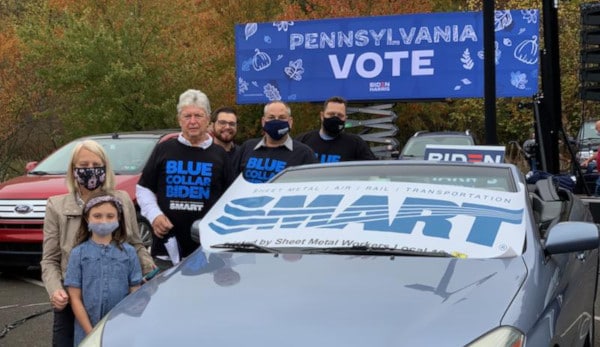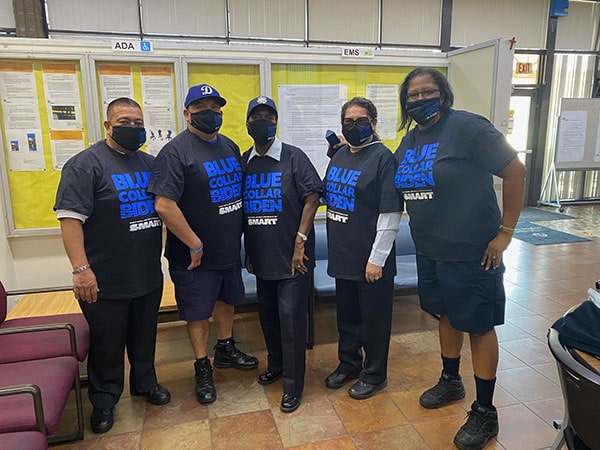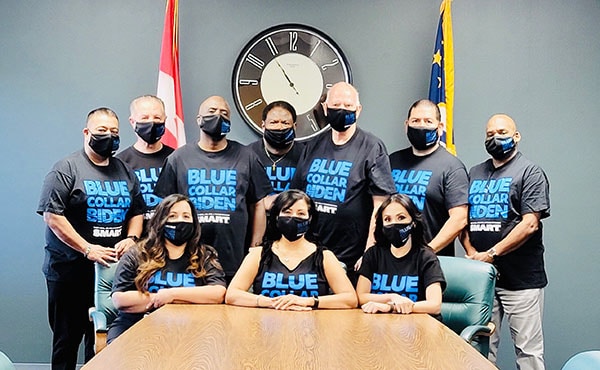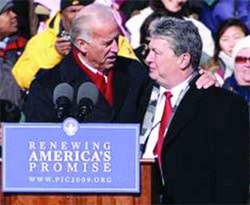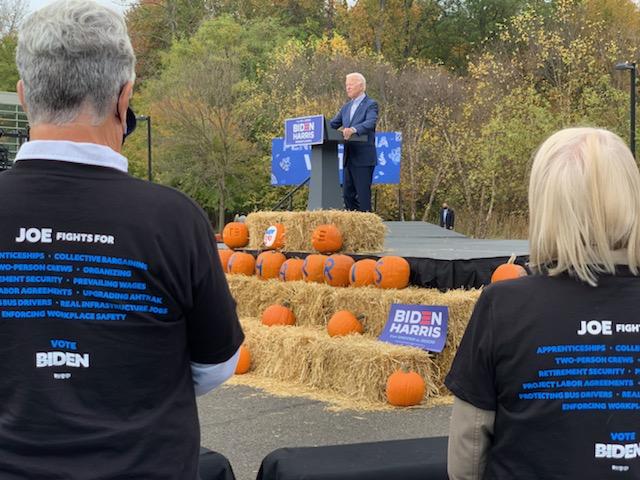
SMART representatives had a front-row seat as Democratic presidential candidate former Vice President Joe Biden spoke Oct. 24 at Bristol Community College in Bristol, Pa.
SMART-TD New Jersey State Legislative Director Ron Sabol and Gregg Weaver, a retired TD Local 838 member and former Local 1390 officer who served as a conductor for many Amtrak rides taken by Biden, were in the front row at the “drive-in” rally that was broadcast live on CNN from the town outside Philadelphia.
“What we heard from Joe Biden today was a concrete plan,” Sabol said. “He has a strategy to address the virus. He has a plan to repair the economy. He has ideas and has a strategy to make things better going forward with a focus on transportation and infrastructure.”
Weaver, who worked the rails on both the passenger and freight side with Conrail for 42 years, said Biden has proven his concern for the working people. Weaver’s son, Blake, a Local 838 member, followed in his father’s path and has been an Amtrak conductor for more than 16 years.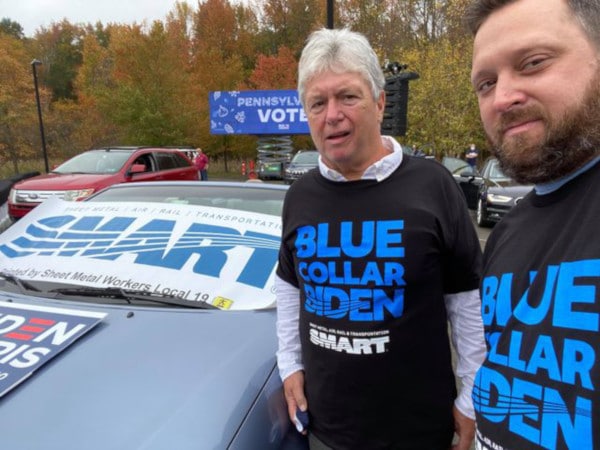
“Everybody wants to talk to him (Joe Biden) after the speech – there were politicians, the big-money donors who have millions,” Weaver said. “He didn’t go after the big donors. He picked a blue-collar working man to come talk to him. He has time for us.”
Biden addressed the COVID pandemic at the outset, mentioning that the country had set a record for daily cases with more than 80,000. The Biden campaign has observed social-distancing and mask protocols at its rallies to avoid the transmission of COVID-19. Most of the attendees participated in the rally from their cars, honking their horns in unison to show appreciation during the speech.
“I will shut down the virus, not the economy,” Biden said. “We can build back better.”
With just days until Election Day, Biden’s speech touched upon a number of union-related issues, such as infrastructure, the gigantic $1.5 trillion corporate tax cuts in late 2017 that remain the signature legislative accomplishment of the current administration and the worsening COVID-19 pandemic.
“This guy’s not on the level. He thinks Wall Street built thus country,” Biden said. “You and I know who built this country … working people built it — the middle class, and unions built the middle class.”
In the April 2018 SMART Transportation Division News reported how Class I rail carriers reaped great benefits from those Republican tax cuts.
Union Pacific (UP) received a $5.8 billion boost. CSX saved $3.6 billion, Norfolk Southern (NS) about $3.48 billion and Kansas City Southern (KCS) $488 million. BNSF, a Berkshire Hathaway subsidiary, reported in its Form 10-K filing to the U.S. Securities and Exchange Commission that it received a tax benefit of $7.4 billion. Savings for the two Canadian-based Class I railroads also increased, reported at $1.4 billion (U.S.) for Canadian National (CN) and about $406 million (U.S.) for Canadian Pacific.
“Vice President Biden understands where working people are coming from. He’s been there. He knows what kind of struggle the working people of country are going through,” Sabol said. “With Biden, SMART members, labor and the middle class will absolutely have a seat at the table.”
Today, thousands of SMART members and other unionized essential frontline employees still are waiting for additional assistance and protections that are being blocked by the Republican-controlled Senate. For others, enhanced unemployment and sickness benefits that were in effect and a lifeline early in the pandemic have expired.
“How many [parents] a day can look at their kids and say with confidence, ‘everything’s going to be OK’ and mean it?” Biden asked. “Times are hard. Unemployment is way up. Folks are worried about making their next rent or mortgage payment, whether their health care will be ripped away in the middle of a pandemic. Worried about sending their kids to school … worried about not sending them to school.
“They see folks at the top doing much better while the rest are wondering who’s looking out for me. That’s Donald Trump’s presidency.”
Legislation to help union workers such as the HEROES Act and the Moving Forward Act has been stopped by Trump and his Republican allies, including Majority Leader Mitch McConnell in the Senate.
Weaver reminds his SMART-TD brothers and sisters that railroaders especially need to keep in mind that their benefits are vulnerable to the whims of Capitol Hill.
A vote for Trump and for his Republican allies is opening the door for workers’ health care, jobs and pensions to be targeted, he said. Children would be off their parents’ health coverage at age 18 instead of being covered until age 26 under the Affordable Care Act.
Weaver said a vote for Democrats would protect union jobs and railroaders. Biden would not be hostile to Amtrak, whereas Trump and Republicans have habitually tried to cut funding for the national passenger rail network.
“Joe Biden has got their backs. He’s not going to make things worse for them,” Weaver said. “There will be a lot less fighting with the Democrats than with the Republicans.”
Biden gave a brief outline of his economic recovery plan — taxes would not be raised on any family making less than $400,000, while making corporations pay their fair share.
“It’s time for working people and the middle class to get tax relief,” Biden said.
He also said his administration would focused on job creation and education.
“We’re going to create millions of union jobs modifying the infrastructure to modernize it, “ he said.
Biden also emphasized in the speech that he is not banning fracking, an accusation leveled by Trump lately on the campaign trail.
Tag: 2020 election
Gregg B. Weaver, a retired member of SMART-TD Local 898 who rode with former Vice President Joe Biden many times during the longtime senator’s commute from Delaware to Washington D.C., was featured in a video presented Monday, Aug. 17, during the first night of the Democratic National Convention.
In the video, the former vice president’s respect and empathy toward the SMART members who served him as he traveled on Amtrak were highlighted.
“I think he’s most comfortable around everyday, working-class people,” Weaver said. “He makes you feel like you belong.”
Another instance of Biden’s concern came after he heard that Weaver had had a heart attack, Weaver recalled in the video.
“I was in a barber shop in New York City and the phone rings,” Weaver said. “And sure enough, it’s Vice President Biden asking how I’m doing — wanted to know the whole story. Kind of funny that you’re talking to the Vice President of the United States, but if I would have told the people in the barber shop, I don’t think they would have believed me.
“I’m not saying like it was me and I’m anything special. Everyone was special to him. We have heroes all over this country … the average guy is important to him.”
The SMART Transportation Division was among the 36 signatories in a letter sent Aug. 4 calling on leaders in Congress to provide $36 billion in emergency aid to public transportation agencies as the economy continues to be staggered by the COVID-19 pandemic.
The letter delivered a stark warning to lawmakers: without at least $32 billion in emergency funding, transit systems in both urban and rural areas face irreversible harm. In the letter, the organizations explained that physical distancing measures, including stay-at-home orders, have taken a serious toll on demand for public transportation services. This, in turn, has placed a major strain on funding sources public transportation agencies traditionally rely on, including farebox revenue and sales tax receipts.
The text of the letter appears below:
Dear Speaker Pelosi, Leader McConnell, Leader McCarthy, and Leader Schumer:
On behalf of the millions of Americans who rely on public transportation every day, the 435,000 frontline workers who operate and maintain those systems, and the public transportation agencies that serve communities across America, we urge you to include at least $32 billion in funding for public transportation in the next COVID-19 emergency response bill.
As you know, physical distancing measures, including stay-at-home orders, have taken a serious toll on overall demand for public transportation services. This has placed a major strain on the revenue sources public transportation agencies count on for continued operations, including farebox revenue and sales taxes. Nonetheless, throughout this crisis, millions of Americans have continued to depend on reliable and safe public transportation to get to and from work and for other essential services.
Without robust public transit systems in our urban and rural communities alike, the national economy will not be able to recover. As recently reported in The New York Times, some public transit systems are in danger of heading into a “transit death spiral” where evaporating revenues lead to cuts in services, which in turn cause riders to find alternative means of transportation if they can, further incapacitating transit systems to the point where they become insolvent and inoperable. Communities and transit agencies of all sizes are hurting, and critical emergency funding must be made available immediately to avoid a worsening crisis.
Millions of essential workers bravely fighting on the front lines of this pandemic have no other means of transportation. Healthcare, grocery, and other workers will be put at risk of losing their jobs and livelihoods. And families who rely on transit for transportation to pick up food, get to work, and meet their health care needs will be left stranded. Likewise, Americans who depend on paratransit service and Medicaid recipients who receive medical transportation for critical care services will lose their only transportation lifeline. Seniors, communities of color, and other groups who disproportionately rely on transit will be particularly hard-hit, further weakening our country at the worst possible time.
Unfortunately, if Congress does not provide the necessary funding for public transportation in the immediate future, the traveling public will suffer. Allowing vital transportation services to lapse in the middle of a global pandemic will guarantee more harm to our communities and place the economic well-being of the American public in jeopardy.
Our communities across the country are depending on you to act swiftly and decisively to save public transit. This will require an immediate investment of at least $32 billion in our transit systems. We urge you to include this funding in the next aid package.
Sincerely,
Amalgamated Transit Union
Active Transit Alliance (Chicago, IL)
American Public Transportation Association
American Federation of State, County and Municipal Employees
Better Bus Coalition (Cincinnati, OH)
Brotherhood of Railroad Signalmen
Central Ohio Transit Authority (Columbus, OH)
Center for Disability Rights (Rochester, NY / Washington, DC)
Central Maryland Transportation Alliance
Chicago Transit Authority (Chicago, IL)
Circulate San Diego
Coalition for Smarter Growth (Washington, DC)
International Association of Machinists and Aerospace Workers
International Association of Sheet Metal, Air, Rail and Transportation Workers – Transportation Division (SMART-TD)
International Brotherhood of Electrical Workers
International Brotherhood of Teamsters
Investing in Place (Los Angeles, CA)
Los Angeles County Metropolitan Transportation Authority (Metro) (Los Angeles, CA)
Metropolitan Transit Authority of Harris County (Houston, Texas)
Metropolitan Transportation Authority (New York, NY)
National Conference of Firemen & Oilers, SEIU
Pittsburghers for Public Transit
Riders Alliance (New York, NY)
San Francisco Transit Riders
Southeastern Pennsylvania Transportation Authority (SEPTA)
Sound Transit (Seattle, WA)
The Street Trust (Portland, OR)
Transit Forward Philadelphia
Transit Matters (Boston, MA)
Transportation for America
Transportation Communications Union/IAM
Transport Workers Union
Tri-State Transportation Campaign (NY, NJ, CT)
Transportation Choices Coalition (Seattle, WA)
Transportation Trades Department, AFL-CIO
Washington Metropolitan Area Transit Authority (Washington, D.C.)
The SMART Transportation Division (SMART-TD), Brotherhood of Locomotive Engineers and Trainmen (BLET) and the Academy of Rail Labor Attorneys (ARLA) have filed a joint motion and brief urging the United States Supreme Court to prevent railroads from seeking property damages from their employees who are involved in railroad accidents.
The joint amicus curiae brief was filed in the case of Melvin Ammons and Darrin Riley v. Wisconsin Central, Ltd. Following a 2014 derailment, Conductor Ammons and engineer Riley filed suit under the Federal Employers’ Liability Act (FELA), claiming the carrier had failed to provide a safe place to work resulting in injuries to them. In its counter claim, Wisconsin Central blamed Ammons and Riley for causing the accident. The carrier further argued that the crew acted in a negligent manner and sought damages from the employees in excess of $1 million for damage to railroad property.
In their brief, SMART-TD, BLET and ARLA argue that to allow a railroad to recover property damages from employees following an accident is an unlawful device that permits the railroad to evade its own legal liability, and will create a potential catastrophe in the railroad industry because the safety-reinforcing purpose of FELA will be destroyed.
“No tactic by the railroads has more potential for destroying employees’ rights — the exclusive remedial recourse available to railroad employees — under the Federal Employers’ Liability Act (‘FELA’ or the ‘Act’) than allowing a railroad to seek property damages from an employee arising out of an accident,” the group wrote in its amicus brief.
Congress created the FELA in 1908 with the “twin objectives of providing effective relief to railroad workers injured or killed because of their employer’s negligence and giving railroads an economic incentive to improve the safety of this nation’s railroads.” This remedial purpose was underscored by amendments to the Act in 1908 and numerous times thereafter.
The FELA prohibits a railroad from utilizing “any device whatsoever” to exempt itself from liability. SMART-TD, BLET and ARLA contend that seeking property damage from employees in the event of accidents is such a device, and one that would basically exempt railroads from liability.
It was explained to the Supreme Court that “[i]t was not the intention of Congress in enacting FELA, with the inclusion of ‘any device whatsoever,’ that by the device of a claim for property damages, a railroad may avoid financial liability for its negligence, collect damages from an employee or drive an employee to bankruptcy, and whether it be the collection of damages or employee bankruptcy, dissuade other employees from filing FELA claims.”
SMART-TD, BLET and ARLA also argue that allowing employees to be sued for property damages would jeopardize safety in the railroad industry and discourage future safety improvements. In its brief, the group wrote: “Congress’ purpose in enacting FELA was to shift the cost of the ‘human overhead’ of railroading from the injured employees to their railroad employers. Allowing railroads to offset their FELA liability by shifting these losses back to the employees through property damage claims frustrates that Congressional design and jeopardizes the safety of the nation’s rail system.”
A copy of the amicus brief can be found here (PDF).
